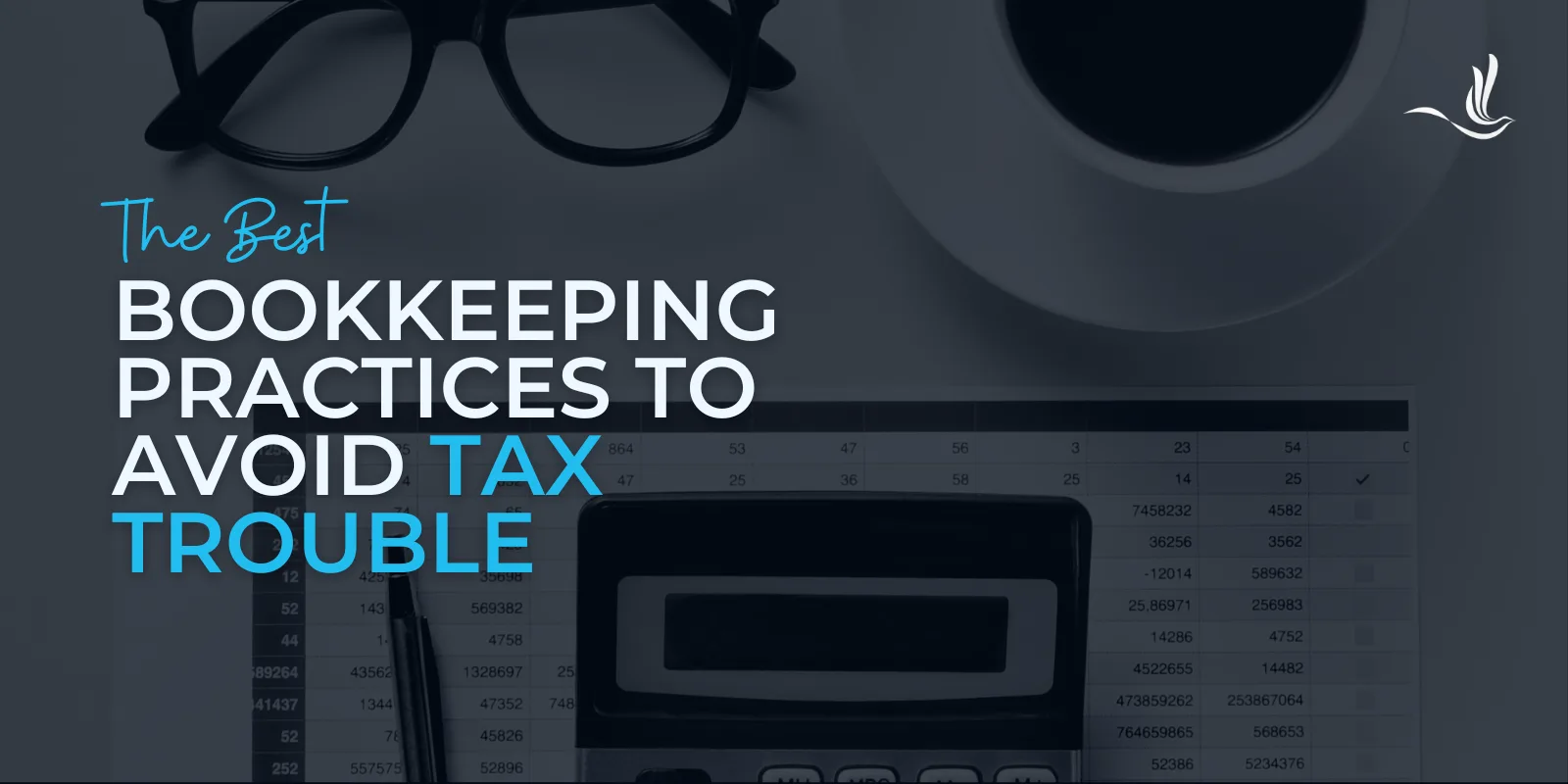Key Takeaways:
Know your tax obligations and deadlines, including estimated quarterly payments, to avoid late fees and penalties.
Keep accurate, real-time records and reconcile accounts monthly to ensure your books match bank and credit statements.
Separate personal and business finances with dedicated accounts and cards to protect deductions and reduce audit risk.
Classify expenses correctly, track deductions with supporting documentation, and use IRS categories to stay compliant.
Review your books regularly, set aside 25–30% of profits for taxes, and use forecasting to manage cash flow.
Leverage bookkeeping software and consider professional help (CPA or bookkeeper) as your business grows in complexity.
Staying on top of your business finances is one of the smartest moves you can make as an entrepreneur. Bookkeeping isn’t just about tracking what comes in and goes out. It’s about protecting yourself from costly mistakes, IRS penalties, and unexpected tax bills. With the right system, you can save time, maximize deductions, and reduce the risk of an audit. In this article, we’ll explore the best bookkeeping practices for taxes and how you can implement them in your business today.
Understand Your Tax Obligations and Deadlines
Before diving into systems and tools, you need to know what you’re aiming for. Bookkeeping isn’t just about numbers. The most important thing is compliance.
Different Business Structures Mean Different Tax Rules
A sole proprietor files taxes differently than an LLC, S corporation, or C corporation. For example, sole proprietors report business income on Schedule C, while S corporations must file Form 1120-S and issue K-1s to shareholders. If you don’t understand your structure’s requirements, you risk missing forms or deadlines.
Federal, State, and Local Tax Obligations
Your bookkeeping must account for more than just federal income tax. You may owe:
Payroll taxes if you have employees
Sales tax if you sell taxable goods or services
Franchise or excise taxes depending on your state
Failing to track these separately can lead to expensive penalties later.
Make sure you prioritize state taxes as you do federal to avoid state tax audits.
Estimated Tax Payments
Most small business owners must make quarterly estimated tax payments. If your bookkeeping doesn’t clearly show profits and cash flow, it’s nearly impossible to know how much to pay. Missing these deadlines can trigger underpayment penalties.
Staying Updated
Tax laws change constantly. For example, meal deductions dropped from 100% in 2021–2022 back down to 50% in 2023. If you weren’t tracking this properly, you could lose legitimate deductions or face IRS adjustments.
Maintain Accurate, Organized, and Up-to-Date Records
Clean books are the foundation of tax compliance. Sloppy or incomplete records make it easy to miss deductions and nearly impossible to defend yourself in an audit.
Recording Transactions in Real Time
Don’t wait until the end of the month, or worse, the end of the year, to log income and expenses. Entering transactions as they happen ensures nothing is forgotten. For example, that $25 parking expense from a client meeting may not seem like much, but dozens of small items add up to hundreds of dollars in deductions. Here’s what you should track:
Invoices issued to clients
Receipts and vendor bills
Bank and credit card statements
Payroll records (if applicable)
Make sure every transaction is backed by a receipt or digital record.
Reconciling Accounts
Reconciling means comparing your books to your bank and credit card statements. Do this monthly to catch errors quickly. For example, if your bank shows a $1,000 vendor payment but you accidentally entered $100 in your system, reconciliation ensures you correct the mistake before tax time.
Backups and Storage
The IRS generally requires you to keep records for at least three years, but some situations require up to seven. Cloud-based bookkeeping software automatically backs up data, while paper receipts can be scanned and stored digitally. The key is consistency. You don’t want to scramble for documentation years later if the IRS comes knocking.
Separate Personal and Business Finances
Mixing business and personal money is one of the fastest ways to create tax problems.
Why Separation Matters
If you use the same bank account for both personal and business expenses, it becomes nearly impossible to prove what’s deductible. Worse, commingling funds can “pierce the corporate veil” in legal cases, exposing your personal assets. Be sure to:
Open a dedicated business bank account for all income and expenses.
Use a business credit card for purchases to build credit and track expenses.
Pay yourself properly through an owner’s draw or salary, rather than dipping into business funds at random.
Let’s look at an example. Imagine you buy office supplies at Target and groceries in the same trip, using your personal debit card. Months later, you may not remember which part of that $150 purchase was for business. If audited, you could lose the deduction entirely. A dedicated card avoids this confusion.
Classify Expenses Correctly and Track Deductions
Even the best records are useless if expenses are categorized incorrectly. Proper classification helps you maximize deductions and avoid red flags.
Commonly Misclassified Expenses
Meals and entertainment: Only 50% deductible if directly related to business.
Home office: Must be a dedicated, regular-use space.
Vehicles: You must choose between standard mileage rate and actual expenses, but you can’t mix both.
Travel: Business trips are deductible, but personal vacations are not, even if you took a client call while away.
Using IRS Categories
Bookkeeping software typically follows IRS tax categories (advertising, office supplies, utilities, etc.). Staying within these categories makes your return easier to file and defend.
Supporting Documentation
For every deduction, keep proof. For example, if you deduct a business meal, save the receipt and jot down who you met with and the business purpose. This small step can save you during an audit.
Timing Expenses Strategically
Some deductions can be accelerated. For instance, if you buy a laptop in December instead of January, you can deduct it on this year’s taxes. Strategic timing requires accurate bookkeeping, so you know when such moves make sense.
Conduct Regular Reviews and Internal Checks
Even with automation, mistakes happen. Regular reviews catch problems before they snowball.
Monthly and quarterly check-ins: Review your profit and loss statement and balance sheet monthly. Quarterly, check whether your estimated tax payments align with your actual profits.
Bank and credit reconciliations: As mentioned earlier, reconciliations are crucial. They help uncover double charges, missing deposits, or fraudulent activity.
Internal controls: If more than one person handles your finances, set clear controls. For example, the person writing checks shouldn’t also be the one reconciling bank accounts. This prevents both errors and fraud.
For example, let’s say a business owner discovered during a quarterly review that an old software subscription was still billing $79 per month for nearly a year. That’s almost $1,000 in wasted cash, caught only because of a routine review.
Work with Professionals When Needed
DIY bookkeeping works in the early stages, but as your business grows, so does complexity.
When to Outsource Bookkeeping
You’re spending more time on books than on revenue-generating tasks.
Your business involves payroll, inventory, or multi-state sales tax.
You’ve been penalized before and don’t want to risk another mistake.
Choosing the Right Professional
Look for credentials like CPA or Enrolled Agent. Industry experience matters too. A bookkeeper who understands e-commerce, for example, knows how to handle Shopify and Amazon reporting. You may not need full-service accounting year-round. Some businesses keep daily books in-house but hire a CPA for quarterly reviews and year-end tax prep. This hybrid model keeps costs reasonable while ensuring compliance.
Maintain Cash Flow and Plan for Tax Payments
Good bookkeeping is also crucial to financial health. Be sure to:
Set aside funds for taxes: A common rule of thumb is to set aside 25–30% of profits for taxes. Some business owners use a separate tax savings account so they aren’t tempted to spend it.
Budget and forecast: Cash flow projections help you anticipate when tax bills are coming due. For example, if you know your quarterly tax is $8,000, you can plan ahead rather than scrambling at the deadline.
Deal with large tax bills ASAP: If you still end up owing more than expected, communicate with the IRS. Setting up a payment plan is far better than ignoring the debt. Proper bookkeeping ensures you know what you owe early enough to act.
Leverage Tools and Software for Compliance
Technology makes modern bookkeeping easier than ever. If you plan to use online tools and software, look for those that:
Receipt capture via mobile app
Built-in tax categories
Cloud access and backups
Bookkeeping software can generate reports like profit and loss, cash flow, and expense by category. These aren’t just for taxes. They also help you make smarter business decisions. Look for software with two-factor authentication and encrypted backups. Losing your records to a cyberattack or hardware crash could be disastrous during tax season.
Common Mistakes to Avoid
Even well-intentioned business owners make errors. Here are some critical errors to avoid:
Procrastinating on bookkeeping: Waiting until tax season to catch up creates stress and guarantees mistakes. Regular maintenance is easier and more accurate.
Overlooking small expenses: Business owners often skip recording $5–$20 purchases. But if you miss just $50 per week, that’s $2,600 per year in lost deductions.
Misclassifying expenses: Categorizing a personal dinner as a business meal, even accidentally, can raise red flags. Consistency is key.
Ignoring discrepancies: If your books don’t match your bank statements, don’t shrug it off. Small errors can compound and make your tax return unreliable.
Frequently Asked Questions About Bookkeeping and Taxes
What is one of the most common bookkeeping mistakes that business owners make?
One of the most common bookkeeping mistakes is mixing personal and business expenses, which makes it difficult to prove deductions and increases the risk of IRS scrutiny.
What is the best bookkeeping method for small businesses?
The best bookkeeping method for small businesses is typically the accrual method, as it provides a clearer picture of income and expenses, though very small or cash-based businesses may prefer the simpler cash method.
What is the $75 rule in the IRS?
The IRS $75 rule allows businesses to claim certain expenses under $75 without a receipt, but you must still record the amount, date, place, and business purpose to support the deduction.
What is the hardest part of bookkeeping?
The hardest part of bookkeeping is staying consistent with regularly tracking, categorizing, and reconciling transactions to avoid errors and missed deductions.
Can I use bank statements as receipts for taxes?
Bank statements alone are not enough to support tax deductions because they don’t show the business purpose of the expense. The IRS expects receipts, invoices, or detailed records in addition to statements.
What are common tax mistakes for small businesses to avoid?
Common tax mistakes include failing to make quarterly estimated payments, misclassifying expenses, overlooking small deductions, and not keeping accurate, up-to-date records.
Tax Help for Small Businesses
The best bookkeeping practices for taxes aren’t complicated – they’re consistent. By separating finances, recording transactions accurately, classifying expenses correctly, and conducting regular reviews, you set yourself up for smooth tax filings and fewer headaches. Add in professional help when needed and the right software, and you’ll not only avoid tax trouble but also gain valuable insights into your business performance. Optima Tax Relief is the nation’s leading tax resolution firm with over $3 billion in resolved tax liabilities.
If You Need Tax Help, Contact Us Today for a Free Consultation



























